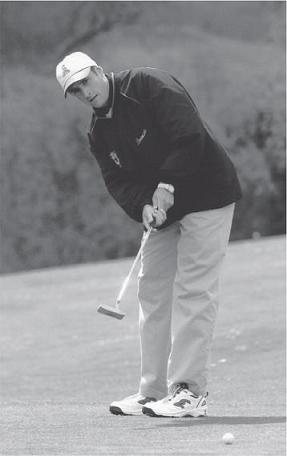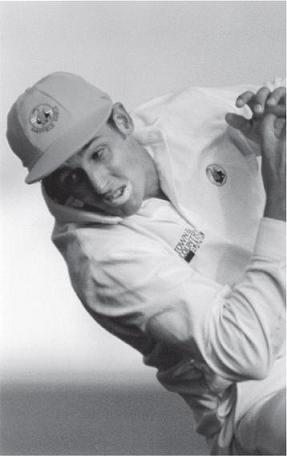Mr Cricket (16 page)

In the lead-up to the World Cup some of the guys, including Adam Gilchrist and Ricky Ponting, had a bit of time off to get refreshed for the World Cup. I wanted to go to New Zealand, however, even though I wasn't in peak form and the summer had taken a lot out of me.
But I got a new lease of life when I was named captain. What better way could there
be to lift your spirits? Also with a few new players in the team the playing group's energy levels were up and there was a good feeling among the guys.
Despite next to no preparation, I was still confident we could do well because we had a great grounding of good hard cricket over the summer and, with the final World Cup squad yet to be set in stone, there was a lot for the guys in the team to prove to the selectors. I was confident we'd get good results. But it didn't work out that way.
In the first game we were sent in to bat first on a sticky pitch. It was a drop-in wicket and the officials were worried about it deteriorating, so they put a glue on it to hold it together. But, being quite wet and cold and with the covers on the square for a long time, the glue didn't have a chance to dry. That meant the ball was going virtually sideways off the pitch making it extremely hard to bat. After 45 overs I think we were only about 7â130. We just couldn't score runs. I batted for quite a lot of the time and scored 40-odd. But, around the 35- to 40-over mark I could tell the pitch was drying out. Sure enough, we proceeded to get belted. I was disappointed but not overly concerned with the result because it came down to something that was beyond our control. Before we could take a breath we were off from Wellington to Eden Park in Auckland for game two, where we batted magnificently, making well over 300. But in their innings the Kiwis kept finding the boundary and there was little I could do about it. It was a hard ground to defend on because it was so small and the pitch was outstanding. We just couldn't get a wicket at the right time or stem the flow of boundaries, no matter what we tried. I bounced a lot of my ideas off the other senior players, such as Matt Hayden and Brad Haddin, who had captained NSW, but we couldn't devise a way to get back on top. It was just one of those days. Ross Taylor made a brilliant hundred but we could have had him out three or four times. An inside edge would brush the stumps and go for four. A top edge would just sail over third man's head for six. We put down a couple of crucial catches as well, which probably cost us the match in the end and the series.
I looked around the group and thought that maybe we just weren't good enough. We did have opportunities, we had a run-out chance, we dropped a couple of catches and, at this level, you just can't afford to do that. I was able to look at it philosophically and not panic. It highlighted for us exactly what we needed to work on before we got to the World Cup.
Having lost the series, I was expecting a bit of a grilling from journalists. I'd been getting panicked phone calls from Cricket Australia people, asking what was going on. They wanted to know what the problem was and whether there was anything they could do to help. Apparently the word around the streets in Australia was that, because we'd lost five games in a row (including the Commonwealth Bank Series finals), we were in the midst of a massive form slump and it was a disaster that meant we couldn't win the World Cup.
At least I'd scored a few runs in New Zealand which meant I didn't have to face questions about my own form. I needn't have worried. The Australian and New Zealand cricket media understand the game well and realised the long period of playing without a break and a series loss didn't really mean much in the context of the upcoming World Cup.
That said, I wasn't looking for a way out of explaining our losses and I certainly wasn't going to blame it on the amount of cricket we had played that summer. There were no excuses. We were disappointed to lose, but we were positive about the upcoming challenge. We had it demonstrated to us in no uncertain terms that we had to improve in certain areas and it was good to have it spelt out to us just before the biggest one-day tournament of all.
HOW DO I PLAY AT MY PEAK?
PREPARATION: diet, sleep, relax with Amy, practise, fitness, weights, weekly program â no stone unturned
MOTIVATION: at training, at games
INTENSITY: at training, at games
 MONDAY: fielding/fitness
MONDAY: fielding/fitness
 TUESDAY: skills session, net session, long run, fielding
TUESDAY: skills session, net session, long run, fielding
 WEDNESDAY: nets (WACA), weights, skills session, fielding
WEDNESDAY: nets (WACA), weights, skills session, fielding
 THURSDAY: nets (WACA), fielding, write diary
THURSDAY: nets (WACA), fielding, write diary
 FRIDAY: game starts.
FRIDAY: game starts.
We got back to Australia and I had just a couple of days to gather my wits before we headed off on the big tour to the West Indies. It took us two days to get there and I was still feeling the effects of jetlag nearly two weeks later. Luckily, we had a fortnight before the tournament started to play practice games, train and acclimatise. In fact, we prepared as well as I can imagine any Australian team preparing.
It was peculiar to me, then, why I wasn't as excited as I should have been coming into that first game. It was the World Cup, yet I wasn't really feeling primed. Maybe it was because we were playing Scotland first up and we knew we shouldn't have much trouble winning. That was the likely reason, I think, because when we played South Africa in the third game, I was a different person and was very excited about playing.
It was a very long tournament and I know there was a lot of talk in Australia about the tournament dragging on and on. But the fact that we had plenty of time between matches was crucial for us, having played such a long stretch of cricket beforehand. We were all missing our families and homes and there were times when many of us felt tired from the regular travelling and playing. But the time between matches allowed us to recover properly, relax a bit, do the appropriate training and also have a bit of time to ourselves.
History will show that we won the World Cup in about as convincing a manner as possible. However, it was only after I returned home from the tournament that I realised that I'd gone into the World Cup a bit fatigued and not at my best. With a gigantic program ahead of us again throughout late 2007 and into 2008, mental fatigue is going to be an issue I'll have to confront again.

The best way I can describe mental fatigue when playing is you can't quite concentrate on the next ball 100 per cent because there's a hazy sort of feeling enveloping you. The best way to deal with it is to take your mind off the game. It's something that Ricky Ponting is very good at and it's something I need to get better at. I need to find things I enjoy doing away from the game and also be able to not think about the game while doing those things.
When I'm away from my family for long stretches it can be hard to completely relax and switch off from cricket. Watching a DVD used to be one tactic of mine because it's a bit of an escape and quite relaxing. But often when I'm watching the movie my mind will start wandering again about cricket or a meeting or a briefing or a sponsor's function or whatever. Ten minutes will go by and I'll have to rewind the movie to find out what I've missed!
Mental fatigue is probably something that's always been a constant in my career but it's never been spelt out to me as clearly as that huge summer of the NZ tour and the World Cup. Having been confronted with it, I'm now determined to devise new strategies and routines to beat it.
The rotation policy is here to stay, I guess, given the amount of cricket and travelling involved playing for the national team. That workload is only going to increase in the future. So whatever fears I have of someone taking my place and holding on to it can best be eliminated by making sure that each and every time I play for my country I am fresh and at full capacity.
